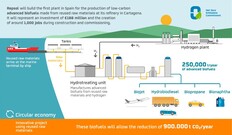- The plant in Cartagena will produce 250,000 tons of advanced biofuels annually.
- The project involves an investment of €188 million and will be operational by 2023.
- The facility will produce hydrobiodiesel, biojet, bionaphtha, and biopropane.
- The plant will reduce CO2 emissions by 900,000 tons per year.

Project Overview
Repsol is set to build Spain's first advanced biofuels plant at its Cartagena refinery. The facility will produce 250,000 tons of advanced biofuels annually, including hydrobiodiesel, biojet, bionaphtha, and biopropane. The project represents an investment of €188 million and is expected to be operational by 2023.
Environmental Impact
The new plant will significantly contribute to reducing CO2 emissions, cutting them by 900,000 tons per year. This aligns with Repsol's commitment to achieving net zero emissions by 2050 and advancing the circular economy by using recycled raw materials.
Technological Advancements
The facility will feature cutting-edge technology, including a hydrogen plant that will fuel a new hydrotreatment unit. This state-of-the-art technology will enhance the efficiency and sustainability of biofuel production.
Economic and Employment Benefits
The construction and commissioning of the plant will generate economic activity and employment in Spain. The project will involve around 1,000 professionals from various fields, supported by auxiliary companies, and will be carried out in different phases.
Regulatory and Strategic Context
This initiative positions Repsol ahead of regulatory requirements, contributing to Spain's targets for renewable energy in transportation. The European Union aims for 14% renewable energy in transportation by 2030, while Spain's Integrated National Plan for Energy and Climate sets a target of 28% by the same year.

